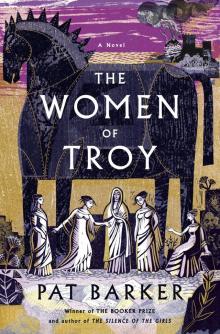- Home
- Pat Barker
The Women of Troy: A Novel Page 10
The Women of Troy: A Novel Read online
Page 10
“Hecuba?”
Instant outrage. Is he really so reduced in status that he can be summoned by a slave to see a slave? Because that’s what Hecuba is now—no matter that she’d once been queen of Troy. But then he starts to remember her as she used to be. She—Priam too, of course—always attended the temple on days that were especially sacred to Apollo. The first time he saw her he must have been…what, fourteen, fifteen years old? A little more, perhaps. As he’d knelt to offer Priam the first cuts of meat from the sacrifice, he’d stolen a sidelong glance at her, where she sat in a gold-embroidered robe with diamonds flashing in her hair. How old would she have been? Not young; even as long ago as that, she couldn’t have been young. And she wasn’t beautiful, not in the way many of Priam’s concubines were beautiful; but she did have the most extraordinary voice, deeper than women’s voices generally are—and with a rasping quality that might have been unpleasant, but wasn’t. He’d thought about her later, lying on his pallet bed trying to get to sleep with all the sights and sounds of the feast day revolving inside his head, and her voice had made him think of a woman’s nails being dragged down a man’s back, all the way from the nape of his neck to the cleft in his arse—but gently, very gently, leaving only the faintest score marks on the skin. Sixteen, he’d have been. An age when really all you think about is sex.
“What does she want?”
“I don’t know, sir, she didn’t say.”
“Well, tell her—” He bites the words back.
The girl stood, breathing softly.
“Tell her I’ll come when I can.”
* * *
——————
There is no business to detain him in Agamemnon’s compound, and yet he can’t bear to leave. He waits in his hut all day and still the summons doesn’t come; so, in the late afternoon, his shadow stretching far ahead of him along the beach, he sets off for Odysseus’s compound. Frustrated, bad-tempered—yes, but curious too. He’s astonished to realize there’s still a slight undertow of attraction—but she’s an old woman now, too old to arouse feelings of that sort.
He finds her lying on a pallet bed, her head raised on two pillows—so evidently some effort has gone into making her comfortable, though the blanket she lies under is far from clean. When she pushes it to one side, it exhales a breath of sickness, of old flesh. He wishes he’d remembered to bring the half-lemon stuck with cloves that he always carries whenever he’s obliged to visit the more malodorous parts of the camp.
“Hecuba.” No title; what’s the use of pretending?
She peers up at him. “For god’s sake, man, sit down. You always were a streak of piss.”
That same warm, dark, rasping voice. It jolts him out of his predetermined reactions. He looks around the squalid little kennel of a hut, licks his lips like a confused dog—and then, unexpectedly, involuntarily, sits. He’s surprised himself, though not her—she’d taken his obedience for granted. He looks at her, sees the wrinkled neck and the age spots on her skin, sees it all, but none of it matters. She turns her head and he’s a boy again, kneeling at Priam’s feet, gazing sidelong at her.
She reaches for a jug. “Pour yourself a cup. It’s rubbish, but if I can drink it, I’m bloody sure you can.”
“No thanks, not just now.”
He hears himself: stilted, prissy, constipated. His eyes stray to the cake that’s sitting on a platter beside her bed.
“Go on, help yourself, I won’t get through it.” She pushes the platter towards him. “Hecamede’s. You won’t get better than that anywhere.”
“I saw her this morning.”
“Well, yes, of course you did, I sent her.”
She’s as imperious as ever. He remembers her as she was when he first saw her: a small, thin, brown-skinned woman with high cheekbones and a curious habit of sucking in her cheeks as if she’d just tasted something unexpectedly sour. Perhaps, in old age, it actually helps a woman not to have been too beautiful? Hecuba had kept Priam interested, amused, exasperated, frustrated and utterly beguiled through fifty years of marriage. God knows how she’d done it—no tits to speak of either. And she was outrageous; some of the things she came out with. Streak of piss? Really? What kind of language is that for a queen? And she’d been equally outspoken in Troy. He has a distinct memory of Priam with his head in his hands, saying, “Hecuba!” Can’t remember the occasion—some reception for a foreign ambassador.
“Are they treating you well?” he asks, using his index finger to scoop up a blob of cream and pop it onto his tongue.
“Oh, yes. I want for nothing.”
It’s not clear how she means that to be taken. Compared with the palace in Troy, this…hovel—you couldn’t call it anything else—obviously lacks a great deal.
“I get food, I get wine—bloody awful wine, but…” She shrugs. “Odysseus wants me kept alive. He wants me as a coming-home present for that wife of his.”
“Penelope does have an excellent reputation.” God, he sounds so pompous. How has he turned into this person? “I do think she’ll be kind to you.”
“Oh, yes, I know, I know. Faithful Penelope, loyal Penelope, wise Penelope…I was all those things—fat lot of good it did me.”
Faithful, yes; loyal, yes. Wise? Suddenly, he’s impatient to be gone, to get back to his hut, to wait for the real summons—the one that actually matters—but she holds him there, by sheer force of will, it seems, and he’s tired of it, he’s tired of the arrogance of these people who believe they’re born to rule and then, when fate turns against them, can’t—or won’t—adjust. Lying there in her filthy rags on a slave’s bed, she’s still, in her own mind, a queen. Once, he might have found that admirable, but not now. Wise people trim their sails when the wind changes; they don’t sail headlong into a gale. He makes a move to rise, but then looks at her again and recognizes in the sharp cheekbones and hollow temples a different kind of authority. He sees that she’s dying and that she knows she’s dying. It’s this, not some delusional idea that she’s still a queen, that gives her strength. He sees that she fears nobody, because she has nothing left to lose—not even her own life.
“Well, you certainly enjoyed that.”
Looking down at the platter, he sees to his horror that the cake has disappeared. All of it.
“Moderation in all things,” Hecuba says, piously. “Mind, you never were very good at moderation, were you?”
He feels himself blushing underneath the paint. He knows exactly what she’s referring to: one particular, rather unfortunate, incident. Why is she referring to it? That’s the question. She still hasn’t said what she wants—and he wonders now whether she might be capable of blackmail. Well, if she is, it’s not going to get her anywhere. It’s all too long ago, nobody cares—and anyway, who’s going to listen to a slave? His mind whirrs on, automatically calculating risk and probability, planning his next move…There’s no emotion involved now—he can’t afford emotion—but then he looks at Hecuba once again; the light falls on her face and he’s back in Troy again. All the years between, the years of plotting, dissembling, keeping quiet when things were said that violated everything he believed in—all those years have been erased, leaving him stranded, as naked as a hermit crab without its shell.
“We had fun, though, didn’t we?” Hecuba says.
“Now and then.”
“Oh, come on, you know we did.”
Yes, it was fun. It was tremendous fun. He remembers hot summer evenings in Priam’s orchards, moonless nights when you could barely see the person you’d bumped into. Good, while it lasted, but his position at court had become increasingly precarious. Not long after the unfortunate incident, it had been gently suggested that perhaps a celibate priesthood might not be his true vocation. He’d taken the hint and packed his bags, telling himself he’d welcome a change of scene, though in fact he’d been deeply h
urt. Perhaps they were right, he’d thought. And here he is, twenty years on, still a priest, still celibate; though admittedly the celibacy is rather more strictly observed now.
“How’s Agamemnon?” Hecuba asks.
“What makes you think I know? I haven’t seen him since—”
“Since you officiated at my daughter’s death.”
“That wasn’t just me, it was—”
All of us. Every priest in the camp had been there. He’d closed his eyes as Pyrrhus raised the sword, and kept them closed till it was over. Sheer cowardice, and even so the attempt to spare himself had failed. At night, in dreams, he still hears the silence, the gasp from the crowd as the blade fell.
“She died bravely.” He swallows to dislodge the lump in his throat. “Do you know the men put flowers on her grave?”
“The Greeks do?”
“Yes. She was brave, they respect that. And you’ve got to remember it was quick. Seconds. She was dead before she hit the ground.”
“I suppose I have Pyrrhus to thank for that. Well, yes, I suppose I have—he could’ve made a mess of it. God knows he made a big enough mess of Priam. You wouldn’t kill a dog like that.”
“You were there?”
“Yes, I saw it all.”
She throws back her head, exposing her wrinkled neck and throat and a new sound comes from her mouth, a whimpering, like a dog that’s about to howl. He can’t bear it; he has to look away. When he turns back, she’s put her fingers round her mouth; she is actually holding her lips together to stop the dreadful sound getting out. He waits while she brings herself back under control. At last, she straightens up.
“She was a good girl, Polyxena. She’d have taken care of me.” A shuddering breath. “We’d have taken care of each other.”
“They say he’s mad.”
“Agamemnon?”
“Yes—apparently he sends for Machaon every night. Can’t sleep. Downs a whole cup of Machaon’s sleeping draught, still can’t sleep. You know, you’re not supposed to take it with strong wine—try telling that to Agamemnon! Oh, and apparently, he’s started seeing things.”
“What sort of things?”
“Achilles.”
“Oh, I know about that. That’s why Polyxena had to die. Give him a girl, he might stay underground.”
“He’s livid with Menelaus. Apparently, they don’t speak. You know, he’s back sleeping with Helen?”
“Yes—and I’m not surprised. I warned him…I said: Don’t let her anywhere near you—send her home on a different ship. I knew she’d worm her way back—I knew. Oh, well, there you are. Grab a man’s dick, you can lead him anywhere.”
He is inclined to bridle a bit at that, which does seem to imply an unduly low opinion of his sex. She’d been married to Priam, for god’s sake—what did she have to complain about? Not like his own poor mother, fastened to a man who’d been stingy with his money and generous with his fists.
“Has he sent for Cassandra?” she asks.
“Now that I can’t tell you.”
“Can’t—or won’t?”
“We-ell, she did foretell his death…”
“Huh, they think she’ll set fire to the bed, do they? Mind, she did do that once. Set fire to the bed.” Her voice softens. “How is she?”
“Calmer—so I’ve been told; I haven’t seen her.”
“Surely you could ask to see her?”
“No. I don’t know who Agamemnon listens to these days, but it certainly isn’t me.”
“Why do you think that is?”
“I don’t know.”
“Oh, come on, you must know, clever man like you?”
“He quarrelled with Achilles once—and my advice to the assembly went against him.”
“Backed the wrong horse, didn’t you?”
He says, stiffly: “I was telling the truth.”
“I want to see my Cassandra. I’ve lost one daughter. I don’t want to lose her.”
Suddenly, she looks completely exhausted. It is extraordinary how rapidly the colour drains from her face. Even her lips have gone white.
“I can’t help you.”
He hates saying it, though it’s no more than the truth. Agamemnon’s women are kept in close confinement, and his own influence in that compound is close to zero.
“Well, then.” She sets the wine jug aside. “Off you go.”
Dismissed, he stands up, bows—and from sheer force of habit begins to back out of the room; but then catches himself up, sharply. She might suffer from delusions about her status, but that’s no reason for him to share them. He turns on his heel and marches straight out of the door, trying not to hear the chuckle that pursues him down the steps.
14
The next time I went to see Hecuba, the arena was being prepared for an archery competition and I stopped for a moment to watch the targets being set up: crudely painted faces of Trojan warriors left over from training sessions during the war. As many events as possible were being held in the arena because it was comparatively sheltered. Some games—archery and spear-throwing among them—would have been impossible at the training grounds up on the headland where the wind blew even more fiercely than it did down here. I’d turned away and was edging through the outskirts of the crowd towards Hecuba’s hut when the door opened and Calchas came out. We bowed to each other. I was astonished he’d bothered to visit Hecuba; he’d always seemed so totally focused on cultivating powerful men. For a moment, I thought he looked as if he wanted to stop and talk, but then he appeared to think better of it and strode off.
As soon as I entered the hut, I could see that Hecuba looked brighter. Her blankets were folded neatly at the foot of her bed and she was walking, though rather unsteadily, up and down the hut.
“Well,” I said. “Look at you.”
She actually smiled. “I’ll be glad to sit down though.”
I helped her back onto the bed. Not wanting to arrive empty-handed, I’d brought figs, grapes and white cheese and I was pleased to see Hecuba force a little down. There was a jug of wine already on the floor beside her. She was used to the fine wines of Priam’s court, but I noticed again that this rough, peasant stuff went down easily enough, bringing a slight flush to her cheeks.
“What did Calchas want?”
“Oh, what does he ever want? You can’t always tell, can you?” She seemed to be considering whether to say more. “That’s the second time he’s been. We had a good laugh—well, I did. You won’t credit it, but as a young man, he was really beautiful. You know, not just a bit good-looking—absolutely stunning.” She sighed. “Ah, well, some people should just die young, I suppose.”
I think I was rather shocked by her flippancy. The fact is, I couldn’t keep pace with her changing moods. One day she was on the beach, howling for Priam; the next, she mentioned him quite casually, as if he’d just gone ahead of her into the next room. I was nineteen. I knew nothing. It’s taken me nearly fifty years to be able to say: I understand Hecuba.
But I could see she was enjoying herself: drinking wine, eating cheese, gossiping…
“Everybody was chasing him—men and women. Not that he ever ran very fast.” Her voice sank to a whisper. “There was one night, Priam and I were coming back from dinner, and Priam spotted somebody ahead he didn’t want to see—one of his counsellors—oh, I can’t remember his name—never mind, nice man but my god he could go on! So, we did a detour through the bedrooms, and you know how they open off each other? Well, the door of one of them was thrown open and there was Calchas on all fours between two lords…” She giggled. “Plugged at both ends.”
“What did you do?”
“Oh, somebody had the presence of mind to slam the door. Priam laughed about it, but it was a bit much really. I mean, Calchas was supposed to be celibate. God, he was trouble…And yet you
look at him now…Did you ever see such a stick?”
She was enjoying herself, regaling me with gossip from the Trojan court. “Holy Ilium” Troy used to be called, because of its profusion of temples—but it did have another side. I’d been dimly aware of that even as a young girl. So, Hecuba and I ate, drank and laughed—but I felt all the time there was something else, something she wasn’t getting to. We lapsed into silence for a moment, and then she said: “I want to see Cassandra.”
Perhaps because I’d lost my own mother at such an early age, I’ve never been able to bear the thought of mothers and daughters being separated. “All right,” I said, cautiously. “Though it won’t be easy. I doubt she’s allowed out of her hut.”
No reply. Hecuba was sitting with her head turned pointedly away, in her sulky, moulting-bird-of-prey mode. I was remembering Cassandra’s prophecy that her marriage to Agamemnon would lead directly to his death, to the fall of the royal House of Atreus and the destruction of the kingdom that had destroyed Troy.
“Do you believe her? I mean, about Agamemnon being killed?”
Hecuba shrugged. “She gets carried away. People always say it’s divine frenzy, but I could never see it. I think she just makes things up to suit herself.”
Difficult to believe your daughter’s a prophet: the little girl you potty-trained and sang to sleep at night.
“It’s all very precise, though, isn’t it? She says his wife’s going to throw a net over him while he’s in the bath and then hack him to pieces with an axe. Why would she do that?”

 Border Crossing
Border Crossing The Silence of the Girls
The Silence of the Girls Life Class
Life Class Regeneration
Regeneration Another World
Another World The Ghost Road
The Ghost Road Double Vision
Double Vision Toby's Room
Toby's Room Regeneration Trilogy 02 - The Eye in the Door
Regeneration Trilogy 02 - The Eye in the Door The Eye in the Door
The Eye in the Door Noonday
Noonday The Women of Troy: A Novel
The Women of Troy: A Novel